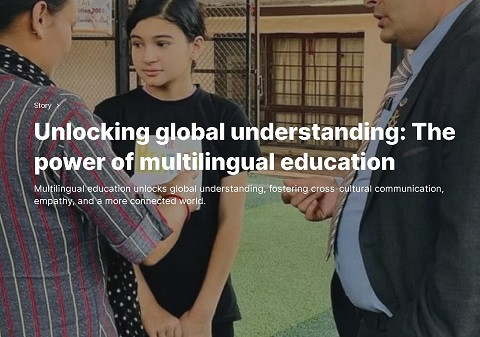
GCED Basic Search Form
Quick Search
当前位置
新闻

Last update: 4 September 2024
By Kabi Paudel
In a world that is increasingly interconnected, multilingual education stands as a beacon for fostering literacy, peace, and understanding. The ability to learn and teach multiple languages not only enhances cognitive abilities but also deepens cultural awareness and empowers individuals to thrive in a globalized environment.
Meet Mr. Ghanshyam Nyoupane, from the land of Mt. Everest and the birthplace of peace (Lord Buddha), and a teacher at Nirvana Secondary School in Kumaripati Lalitpur, Nepal. With 17 years of teaching and learning experience, his knowledge comes from extensive training on diverse texts, allowing him to assist his students on a wide range of topics. Driven by the desire to help others learn and explore, Mr. Nyoupane finds that discovering new things fuels innovation, problem-solving, and continuous growth, which aligns with his passion for teaching and learning.
Growing up in Chhatrakot-4 rural municipality in the Gulmi district of Nepal and achieving 17 years of academic excellence, he faced numerous challenges in achieving education and cherished many memories. His journey reflects personal growth through overcoming obstacles and community support. Reflecting on these experiences, Mr. Nyoupane has learned resilience and the importance of perseverance and community in achieving success.
According to him, young people contribute by embracing multilingual education, bridging cultural gaps, and promoting empathy. Literacy in multiple languages empowers them to understand diverse perspectives, fostering global awareness and cooperation. In his view, their ability to communicate across cultures strengthens connections, reduces misunderstandings, and builds a more peaceful, inclusive, and understanding world.
He argues that young people face challenges like language barriers, digital overload, and uneven access to quality education. Rapid changes in technology and globalization demand quick adaptation, which can strain their language and literacy skills. Balancing cultural identity with global communication also presents difficulties in maintaining fluency and understanding diverse perspectives. While he says that the lack of literacy skills in multiple languages has not affected him directly, for many, it limits job opportunities and social participation: “It can hinder communication in global environments, restrict access to diverse information, and create barriers to understanding different cultures, affecting personal and professional growth in a connected world.”
Furthermore, Mr. Nyoupane he emphasizes that key qualities for success include adaptability, critical thinking, empathy, collaboration, and cultural awareness. Values like respect, integrity, and lifelong learning are vital. He has gained these through a vast array of texts and data, reflecting diverse perspectives. His “learning" comes from being trained in global knowledge, not from traditional schooling.
Mr. Nyoupane praises initiatives such as UNESCO’s Mother Language Day, which celebrate linguistic diversity and promote multilingual education. These programs encourage community involvement, support language preservation, and foster mutual understanding, contributing to more peaceful and inclusive societies through educational and cultural exchanges.
He argues that schools, communities, governments, NGOs, and international organizations can promote multilingual literacy by creating inclusive curricula, offering resources, and fostering cross-cultural exchanges. They should collaborate to make education accessible and relevant. He expects UNESCO to lead global initiatives, provide funding, and advocate policies that support multilingual education, ensuring young and adult learners can contribute to peaceful, understanding societies.
Mr. Nyoupane envisions a future where society values diversity, fostering multilingual education to enhance mutual understanding and peace. This society would celebrate different languages and cultures, encouraging open dialogue, empathy, and cooperation. It would create a global community where everyone feels heard, respected, and connected, promoting harmony and shared growth.
For this year’s International Literacy Day, Mr. Nyoupane urges policymakers and development partners to invest in multilingual education, ensuring access for all. Young people, to embrace diverse languages as tools for connection. For those struggling with literacy, to know that learning is a powerful path to empowerment and a more inclusive world.
Disclaimer: This article series is published with the inputs from the SDG4 Youth & Student Network members. The series provides them with a platform for expression where they present their work as a source of inspiration for others. The ideas and opinions expressed in this article are those of the authors; they are not necessarily those of UNESCO and do not commit the Organization. UNESCO does not endorse any project or organization mentioned in the article.
